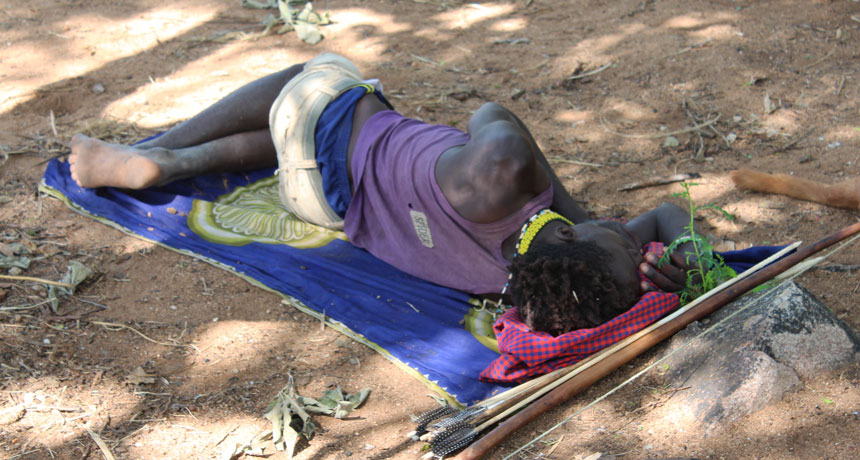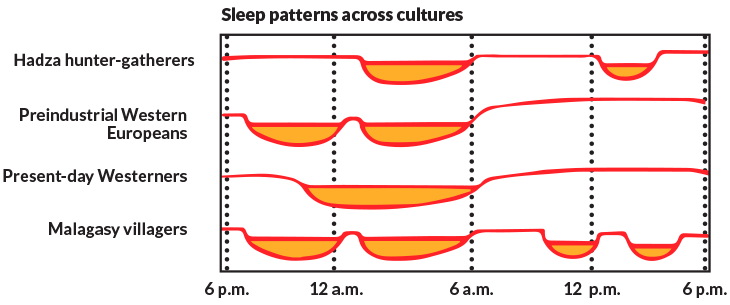Snooze patterns vary across cultures, opening eyes to evolution of sleep
Amount, timing of sleep is less important for health than sticking to routine

SLEEP SUPPLEMENT A Hadza forager in East Africa takes time out to catch a few z’s during the day. Naps enable the Hadza to catch up with their sleep after dozing an average of about 6.5 hours at night, researchers say. Evolution has reduced the quantity and boosted the quality of human sleep relative to other primates, they hold.
D. Samson
Hunter-gatherers and farming villagers who live in worlds without lightbulbs or thermostats sleep slightly less at night than smartphone-toting city slickers, researchers say.
“Contrary to conventional wisdom, people in societies without electricity do not sleep more than those in industrial societies like ours,” says UCLA psychiatrist and sleep researcher Jerome Siegel, who was not involved in the new research.
Different patterns of slumber and wakefulness in each of these groups highlight the flexibility of human sleep — and also point to potential health dangers in how members of Western societies sleep, conclude evolutionary biologist David Samson of Duke University and colleagues. Compared with other primates, human evolution featured a shift toward sleeping more deeply over shorter time periods, providing more time for learning new skills and knowledge as cultures expanded, the researchers propose. Humans also evolved an ability to revise sleep schedules based on daily work schedules and environmental factors such as temperature.
Samson’s team describes sleep patterns in 33 East African Hadza hunter-gatherers over a total of 393 days in a paper published online January 7 in the American Journal of Physical Anthropology. The team’s separate report on slumber among 21 rural farmers in Madagascar over 292 days will appear later this year in the American Journal of Human Biology.
Sleep patterns in these groups were tracked with wrist devices that measure a person’s activity levels. Both Hadza and Malagasy volunteers slept an average of about 6.5 hours nightly, less than the about seven-hour average for most U.S. adults. Foragers and villagers, who slept in areas with various family and group members, awoke more frequently during the night than has been reported among Westerners. Scalp electrodes worn at night by nine villagers during nine nights revealed biological signs of relatively light sleep compared with Westerners, including shorter periods of slow-wave and rapid eye movement sleep.
Story continues below chart.
Doze differences
Dark areas show typical sleep times for Hadza hunter-gatherers, preindustrial Western Europeans, present-day Westerners with 9-to-5 jobs, and villagers in Madagascar with no electricity. Sleep patterns are shaped by local environments and the ways in which groups make a living, scientists contend.

But Hadza and Malagasy individuals often supplemented nighttime sleep with one or two daytime naps. Shut-eye breaks averaged 47.5 minutes for the Hadza and about 55 minutes for villagers. Critically, Samson says, foragers and villagers displayed more consistent daily cycles of sleep and wakefulness than are characteristic of Westerners. Hadza adults tended to hit the sack — or, more commonly, the mat — shortly after midnight and nap in the early afternoon. Malagasy villagers napped once or twice during the day’s hottest hours, usually starting around noon, and retired in the early evening. At night, they slept in two phases, awakening for around an hour shortly after midnight. Historical accounts describe a similar sleep pattern among Western Europeans between 500 and 200 years ago — two sleep segments, divided by a period of activity or reflection (SN: 9/25/99, p. 205).
Nighttime sleep in both populations became deeper and less fragmented as tropical humidity dipped.
Researchers also noted that hunter-gatherers and villagers got plenty of direct sunlight, unlike many Westerners. Several studies have linked inconsistent sleep-wake cycles and lack of sun exposure to health problems, including inflammation and heart problems, Samson says. “People in modern societies can take lessons from this research by attempting to get lots of light exposure during the day while reducing blue-wave light exposure after dark and dropping inside temperatures by a few degrees at night.” Smartphones and other digital devices emit blue-wave light, which can suppress melatonin production and delay sleep.
Effects of wayward sleep patterns or too little sleep on health vary across cultures and regions, says biomedical anthropologist Kristen Knutson of Northwestern University Feinberg School of Medicine in Chicago. For instance, sleeping less than six hours per night may increase appetite, as some studies suggest, but a sleep-deprived office worker surrounded by fast-food joints is more likely to become obese than a physically active hunter-gatherer faced with a limited food supply.
Samson’s research aligns with previous evidence, conducted by Knutson, that rural Haitians living without electricity sleep an average of about seven hours nightly. In addition, Siegel’s team recently reported that nightly sleep averages 5.7 to 7.1 hours in three hunter-gatherer societies, including the Hadza (SN: 11/14/15, p. 10).






